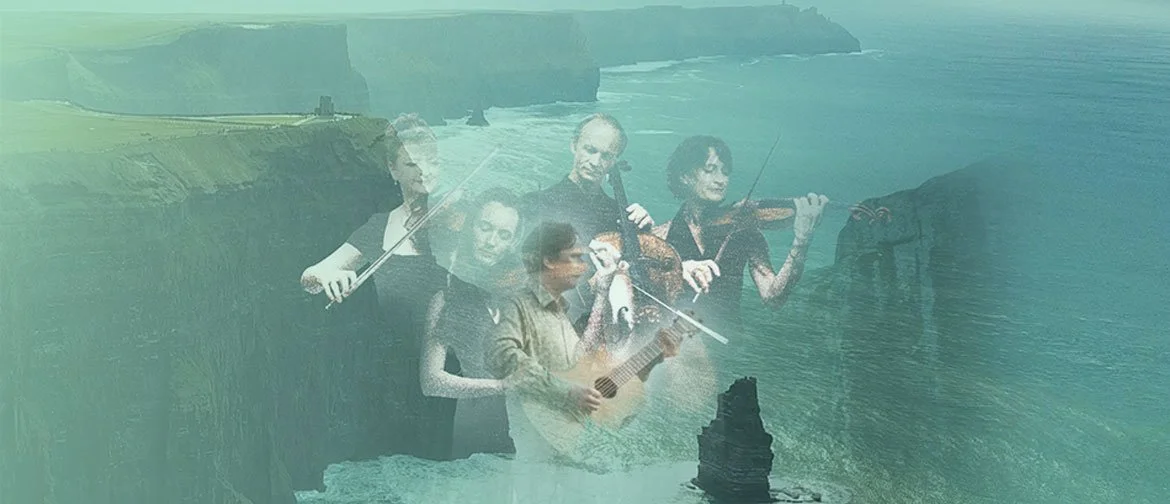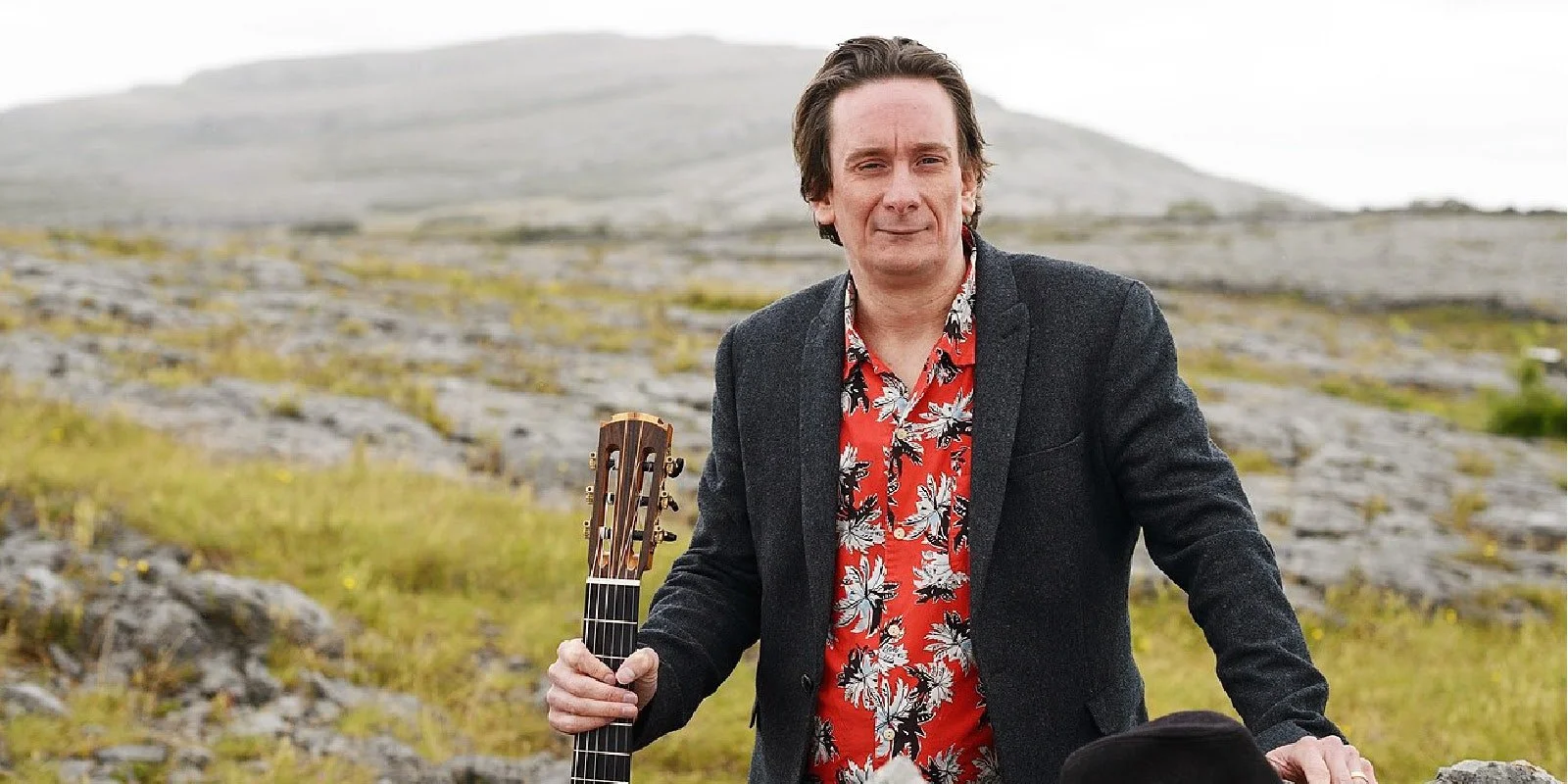New Zealand String Quartet: the wearing of the green
On St Patrick’s Day last week, a full-house crowd gathered for a concert at Wellington’s Public Trust Hall. Over 18,000 kms from the Emerald Isle, many of us wore green, representing, perhaps, the 15% of Aotearoa’s population who have Irish ancestry. The programme, called ‘Irish Airs and Graces’, was devised by musician and composer Dave Flynn in collaboration with the New Zealand String Quartet. The Quartet, always up-for-anything, were rewarded by an enthusiastic audience, the majority new to chamber music.
Irish storyteller Loretta Egan welcomed us in Irish and English. She set the scene in a description of her grandparents’ home from her childhood memories, explaining the importance of musical gatherings around a turf fire to the poor and hard-working agrarian communities of colonised Ireland. Her grandfather, she said, welcomed his guests on St Patrick’s Day by telling them to “leave their troubles outside” and so we did, in a warm atmosphere of joyous music-making.
The programme began with a Farewell to Music, the last composition by Turlough O’Carolan, an Irish composer of the Baroque period, a blind musician who fused Italian baroque techniques with Irish harp traditions. His slow air began with Flynn, who had arranged the work, on electric guitar, the string quartet providing a drone with keening guitar melody above. Joined by three Irish folk musicians on fiddle, accordion and flute, the whole ensemble moved without a break to a contrasting second work, a lively toe-tapping set-dance, The Jockey at the Fair, featuring accordionist Duncan Davidson.
Flynn introduced his arrangement of a classical hornpipe called The Banks, explaining how music travels across borders. Originally composed by Parazzotti, a 19th century Italian-Scottish violinist, it gained fame in Scotland and then moved to Ireland and thereby from classical traditions to Irish ones. The marriage of classical string quartet with Irish folk ensemble in the history of The Banks was personified on stage, the occasional awkward style, balance or acoustic issue mostly insignificant.
The first half of the programme ended with The Rebel Suite, an arrangement by Flynn of polkas and reels from Cork, the “Rebel County”. It had the audience smiling and tapping its toes to music of zest and drive from several acclaimed composers of traditional Irish music.
Composer and musician Dave Flynn
…crossing borders and genres.
Flynn, hailing from Dublin and with New Zealand residency, is a genre-crossing composer and musician who combines orchestral, jazz, rock and folk elements. He had arranged much of the programme and the second half featured three of his compositions, the first the closing aria from his 2014 opera, Mná Brian Boru, a moving Lament for the Falling King. Versatile instrumentalists became singers, the lament sung strongly by flutist Áine Gallagher with vocal accompaniment from fiddle player Em Griffiths. The NZSQ then put down their bows and joined the full ensemble in a compelling hymn-like chorus, singing Irish words that translate as “Goodbye, goodbye, Boru my King”.
The New Zealand String Quartet: from left: Helene Pohl (1st violin), Monique Lapins (2nd violin), Gillian Ansell (viola), Rolf Gjelsten (cello)
Photo credit: Latitude Creative
Next came the engaging movement Slip from Flynn’s 2nd String Quartet, which the NZSQ performed last year on its National Tour. The recipe for its cross-over flavour is Irish fiddle mixed with jazz, with a side of Bartók as Bulgarian folk elements slide in.
It was followed by the most intriguing composition of the programme, the southern hemisphere premiere of Flynn’s three-movement E-Bow for Electric Guitar and String Quartet. An e-bow is a device most often used by rock musicians on electric guitar, and in the first of three movements it became a ghostly presence that reminded me of the other-worldly Theremin. The attractive second movement, a “Foggy Fugue”, meandered whimsically towards the third, “Macalla/Oro”. In te reo Māori “Oro” can mean “to echo” and “Macalla” is the Irish word for echo. It’s a very clever movement, the e-bow replaced by echoing guitar sounds as a fragile bass-line and the pizzicato string quartet passing melodic fragments around like a game of echoes. Growing in agitation into a kind of minimalist repetition, the movement ended with drone-like effects. The audience loved it!
The programme returned to folk tradition for its conclusion, with Lost in the Loop and Cat Chased Mouse, two reels by 20th century composers Liz Carroll and Máirtín O’Connor, arranged by Flynn. Ensemble and audience relaxed into the foot-tapping music endearingly known as “diddly diddly”, with a few whoops from both audience and performers as the pace quickened.
Storyteller Egan returned to the stage to recite, with brilliant drama, a ballad by W B Yeats before the happy evening ended with a delightful encore of Kerry Polkas. No green beer was served but it was a wonderfully convivial evening of music, played with intoxicating verve. Oíche mhaith!
Irish Airs and Graces: New Zealand String Quartet, with composer/guitarist Dave Flynn, and traditional Irish musicians Duncan Davidson (accordion), Áine Gallagher (flute/voice), Em Griffiths (fiddle/voice). Wellington, March 17, 2023.
Auckland, Unitarian Church, Ponsonby, March 31, 2023 Tickets available here



